Entry Plug: Difference between revisions
UrsusArctos (talk | contribs) m (→In Rebuild) |
No edit summary |
||
| Line 1: | Line 1: | ||
[[File:Entry plug 05 C044.jpg|200px|right|thumb|An Entry Plug.]] | |||
{{MontageBox | {{MontageBox | ||
|title=Entry Plug Operation | |title=Entry Plug Operation | ||
Revision as of 23:55, 6 July 2013
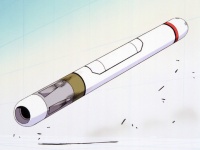
| Entry Plug Operation | |
 |
 |
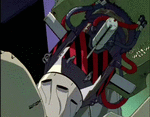 |
 |
An Entry Plug is a long, capsule-shaped object contains the cockpit (and by the extension, the pilot) for an Evangelion Unit.
Entry Plug System
Entry Plugs are inserted into the spinal area of an Evangelion via a loading mechanism[1]. A section of the Evas nape and upper back armour opens, allowing access to modified vertebrae. The entry plug is inserted through the spine, with the pilots end of the capsule reaching down to the Eva's Core. The plug finally spins inwards and locks itself into the Eva's torso, after which the armour is resealed.
During Eva activation, the pilot's entry plug is filled with the liquid LCL, which is oxygenated allowing the pilot to breath. The LCL is subsequently "Electrolysed", becoming completely transparent though remaining a liquid, and allowing full synchronization between the pilot and Evangelion. Following this, the entry plugs interior screens activate, giving the pilot an almost unimpeded 3D view of the Eva's surroundings.
The entry plugs feature a rocket based ejection system. There are also systems for venting the plug's LCL in an emergency. Entry Plugs appear to be immensely strong in construction. Examples include Rei's entry plug surviving Eva-00's self destruction vs Armisael in one piece while most of Tokyo-3 was turned into a crater. Eva-01 took several seconds to crush the infected Eva-03's entry plug. In Episode 05, Rei's entry plug is show to survive being ejected after Eva-00's activation experiment went awry, and in Episode 06, though the plug's exterior had begun to melt, Rei is largely unhurt inside.
A Stop Signal Plug is loaded into an Evangelion after the Entry Plug has been removed, when the Eva is no longer being operated[Source needed].
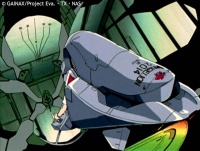
Pilot's Seat and Display
The pilot sits in a large seat-complex, which can be removed from the entry plug entirely via a large hatch on the exterior of the plug. There is also a smaller emergency escape hatch with interior and exterior handles. The pilots only manual controls in the seat are the induction levers and their associated buttons. Apart from the main display, the pilot receives additional information via holographic HUDs which appear as needed. The "blind spots" in the pilots main display canopy are actually an outline of the Eva's body.
The seats themselves feature a large "safety belt" device to fasten the pilot in place, but only Shinji wears this as a matter of course. The other pilots do not wear any restraints ordinarily, but Rei is shown wearing the fastener while firing the Positron Sniper Rifle in Episode 22.
In Episode 23, Rei is shown operating an elaborate self destruct system, situated underneath the pilot's seat.
Other Types of Plugs

| Dummy Plugs | |
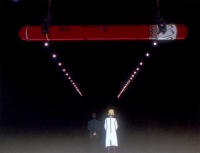 |
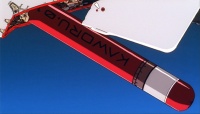 |
Dummy Plugs
- Main article Dummy System
Standard Entry Plugs are white. However, those used in the remote-control Dummy Plug system are red. Depending on whether the governing system is Nerv's or Seele's, the plugs with be labelled as Rei or Kaworu plugs respectively.
The interior workings of the Dummy plugs is completely unknown, and whether the plugs are entirely digital, or somehow possess a biological component is a matter of speculation.
Signal Termination Plug
A Signal Termination Plug seems to be an added means of making sure that an Eva will not start up on its own, while it is being stored and the Eva is not being used. The end of the Signal Termination Plug that sticks out of the back of an Evangelion is shaped like a crucifix.
The Signal Termination Plug is most prominently seen in Episode 02 and Episode 05, when Evangelion Unit-00 is frozen in bakelite after it lost control during an experiment. However, a Signal Termination Plug is seen again (very briefly and in a dark shot) in Episode 11, when it has to be manually removed from an Evangelion so that an Entry Plug can be loaded in.
This device is often referred to by a number of other names "Stop Signal Plug", "Termination Signal Plug", "Terminator Signal Plug" and "Signal Terminator Plug" being common variations in naming.
In Rebuild
| Entry Plugs in Rebuild | |
 |
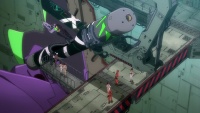 |
In Rebuild of Evangelion the basic design of the entry plugs remains almost completely unchanged. However, certain functions of the plugs and the pilots seat are elaborated on in more detail. The pilots seat is now shown to be capable of moving up and down inside the plug, with the depth of the seat corresponding to plug depth. The entry plug ejection system appears again, and actually ends up being used in combat, but this time the existence of parachutes is explicitly shown. Eva-13 is also shown to feature a D-type entry system, featuring two entry plugs which are no longer inserted through the spine.
The Dummy Plug also returns in Rebuild, though in a much different form. The plug is coloured black and white, with luminous green patches. This time the Dummy system appears to have nothing to do with Rei, coming instead from the mysterious Golgotha Base. After Eva-01 rejects it, this plug can be heard issuing a melodramatic wail.
The AAA Wunder possesses a spherical LCL filled chamber which has many similarities to the Entry Plug system. It's Hirnstamm Tower appears to be a giant multi-pilot version of the Entry Plug pilot seat.
Notes

- During her monologue in Episode 14, Rei refers to the Entry Plug as "The throne of the soul".
References
- ↑ Evangelion pilots can actually enter, then activate, an Eva entirely without external aid if they need to. Although there is a dedicated Entry Plug loading mechanism in Nerv HQ, a pilot can manually open it This is seen in Episode 03 when shinji admits Toji and Kensuke into the entry plug, and in Episode 08, when Asuka triggers the release of Unit 02's Entry Plug by use of a mechanism on the side of the Entry Plug's hatch. The pilot can then launch entirely independent of the control center.
